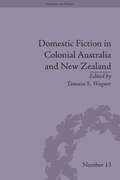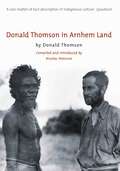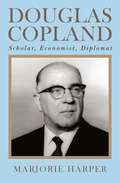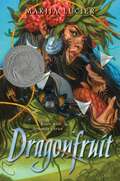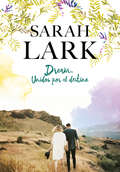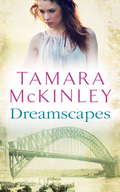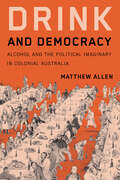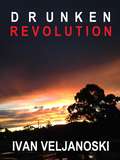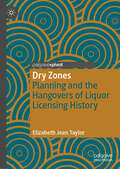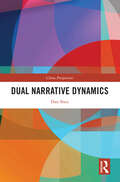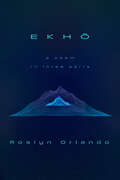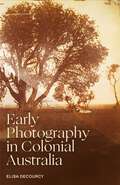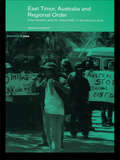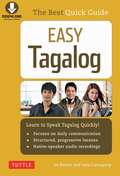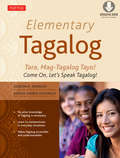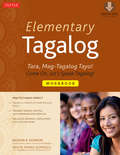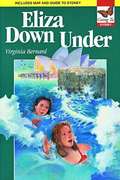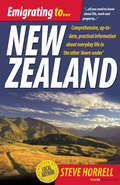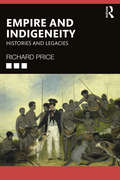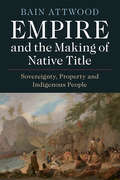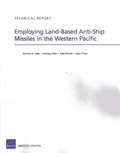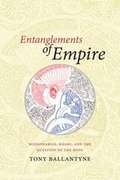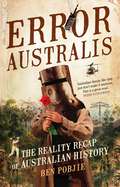- Table View
- List View
Domestic Fiction in Colonial Australia and New Zealand (Gender and Genre #13)
by Tamara S WagnerColonial domestic literature has been largely overlooked and is due for a reassessment. This essay collection explores attitudes to colonialism, imperialism and race, as well as important developments in girlhood and the concept of the New Woman.
Donald Thomson In Arnhem Land
by Nicolas Peterson'I had lived and hunted with these people, accompanied them on their nomadic wanderings and learned their customs and their languages with the result that I understood and believed in them and resented the injustices under which they had suffered for so long at the hands of the white man and other invaders of their territory.' In 1932-33, Yolngu people living in the Caledon Bay area of north-east Arnhem Land were involved in the killing of five Japanese fishermen and three Europeans. A punitive expedition was proposed to 'teach the Aborigines a lesson'. In response, Donald Thomson, a Melbourne-born anthropologist, offered to investigate the causes of the conflict. After seven months of investigation he persuaded the Federal Government to free the three men convicted of the killings and returned with them to their own country, subsequently spending fifteen months documenting the culture of the region. Whilst in Arnhem Land, Thomson, a superb and enthusiastic photographer, made the most comprehensive photographic record of any fully functioning, self-supporting Aboriginal society that we will ever have. The one hundred and thirty images included in this book cover domestic life, subsistence, house types, material culture, and religious life, providing a uniquely privileged glimpse of life beyond the frontier. Thomson recorded his experiences in newspaper and academic articles, private papers and extended reports to the government. Nicolas Peterson brings this material together as a compelling, highly personal narrative in Thomson's own words. It is a narrative that names all the Aboriginal people involved, presenting them as individuals in a way no other writings of the time do. Through it all Thomson's passionate commitment to Aboriginal rights as defender, critic and advocate, shines through.
Douglas Copland
by Marjorie Harper'In Australia the name Copland is one to be conjured with.' The Canadian ambassador to China was addressing the diplomatic corps gathered to farewell Professor Douglas Copland, Australia's second Minister to China. It was early 1948, and Copland was leaving China to become founding Vice-Chancellor of the new Australian National University in Canberra. The compliment was a reference to Copland's outstanding career in Australia as an academic, applied economist, administrator and public intellectual. His academic writings were numerous and timely, his newspaper articles were widely syndicated and he was constantly in demand as a public speaker and broadcaster. Copland's name is perpetuated by a lecture theatre at the University of Melbourne, a building at ANU, a secondary college in the Canberra suburb of Melba and by a series of lectures sponsored by the Committee for Economic Development of Australia.
Dragonfruit
by Makiia LucierAn Asian/Pacific American Award Honor BookA USA TODAY bestsellerOne of NPR's 2024 "Books We Love"A Kirkus Best Book of 2024A School Library Journal Best Book of 2024A New York Public Library Best Book of 2024From acclaimed author Makiia Lucier, a dazzling, romantic fantasy inspired by Pacific Island mythology. In the old tales, it is written that the egg of a seadragon, dragonfruit, holds within it the power to undo a person’s greatest sorrow. But as with all things that offer hope when hope had gone, the tale came with a warning.Every wish demands a price.Hanalei of Tamarind is the cherished daughter of an old island family. But when her father steals a seadragon egg meant for an ailing princess, she is forced into a life of exile. In the years that follow, Hanalei finds solace in studying the majestic seadragons that roam the Nominomi Sea. Until, one day, an encounter with a female dragon offers her what she desires most. A chance to return home, and to right a terrible wrong.Samahtitamahenele, Sam, is the last remaining prince of Tamarind. But he can never inherit the throne, for Tamarind is a matriarchal society. With his mother ill and his grandmother nearing the end of her reign. Sam is left with two choices: to marry, or to find a cure for the sickness that has plagued his mother for ten long years. When a childhood companion returns from exile, she brings with her something he has not felt in a very long time—hope.But Hanalei and Sam are not the only ones searching for the dragonfruit. And as they battle enemies both near and far, there is another danger they cannot escape…that of the dragonfruit itself.
Dream. Unidos por el destino
by Sarah LarkDream. Unidos por el destino, es la segunda novela juvenil de la autora best seller Sarah Lark. Magníficamente escrita, invita al lector a disfrutar de una mágica historia el amor y la libertad. Sarah se muda con sus padres a Nueva Zelanda. A pesar de los paisajes de ensueño, Sarah no puede evitar echar de menos su antiguo hogar en Alemania, las cuadras y, sobre todo, al caballo del que se ocupaba allí. Empieza a interesarse por su nuevo hogar cuando, junto al atractivo y misterioso Lucas, descubre los caballos salvajes del monte Kaimanawa. Sarah se prenda de un semental plateado al que bautiza en secreto como Dream. Cuando Sarah se entera de que los caballos van a ser apresados y domados para hacer sitio al ejército, que necesita construir un campo de maniobras, Sarah está en shock. Para colmo, Dream acaba en manos de un brutal tratante de caballos y Sarah no puede evitar obsesionarse con una idea: ¿Cómo puede devolverle la libertad a Dream?
Dreamscapes
by Tamara McKinleyIf you love Lesley Pearse, you're sure to fall for Tamara McKinley!Catriona was born into the world of show business, having made her first appearance on stage in her father's arms when she was only minutes old. And although life has never been easy for Catriona, it seems she's finally made her big break: her unique voice has captured the attention of a Sydney opera company, and the only place to go is up. But when scandalous secrets from her teenage years threaten to destroy everything she's worked so hard to achieve, she learns she will have to fight to keep her rightful place at the top.
Dreamscapes
by Tamara MckinleyIf you love Lesley Pearse, you're sure to fall for Tamara McKinley!Catriona was born into the world of show business, having made her first appearance on stage in her father's arms when she was only minutes old. And although life has never been easy for Catriona, it seems she's finally made her big break: her unique voice has captured the attention of a Sydney opera company, and the only place to go is up. But when scandalous secrets from her teenage years threaten to destroy everything she's worked so hard to achieve, she learns she will have to fight to keep her rightful place at the top.
Drink and Democracy: Alcohol and the Political Imaginary in Colonial Australia (Intoxicating Histories)
by Matthew AllenThe nineteenth-century spread of democracy in Britain and its colonies coincided with an increase in alcohol consumption and in celebratory public dinners with rounds of toasts. British colonists raised their glasses to salute the Crown in rituals that asserted fraternal equality and political authority. Yet these ceremonies were reserved for gentlemen, leaving others – notably women and Indigenous people – on the political margins.Drink and Democracy traces the development of democratic ideas in New South Wales through the history of public drinking and temperance. As the colony transformed from a convict autocracy to a liberal democracy, Matthew Allen argues, public drinking practices shaped the character of the emerging political order. The ritual of toasting was a symbolic display of restraint – drunkenness without loss of self-control – that embodied the claim to citizenship of white male settlers. Yet the performative sobriety of the temperance movement was also democratic, a display of respectability that politicized its supporters around a rival vision of responsible citizenship. Drink was a way to police the limits of the political realm. The stigma of female drunkenness worked to exclude women from the public sphere, while perceptions of heavy drinking among Aboriginal people cast them as lacking self-control and hence unworthy of political rights.Drink and Democracy reveals that long before the introduction of the franchise, colonists in Australia imagined themselves as citizens. Yet even as democracy expanded, drink marked its limits.
Drunken Revolution
by Ivan VeljanoskiVeljanoski's poems are reflective, intriguing and vigorous. The author views Drunken Revolution as genuine philosophy for our own existence; the democracy, and the equality, the freedom and the unity, the love and the hate . . . In this collection of meditative poetry you will find the connected thoughts of a master of metaphors.
Dry Zones: Planning and the Hangovers of Liquor Licensing History
by Elizabeth Jean TaylorThis book tells the story of local-level controls on liquor licensing (‘local option’) that emerged during the anti-alcohol temperance movement of the late 19th and early 20th centuries. It offers a new perspective on these often-overlooked smaller prohibitions, arguing local option not only reshaped the hotel industry but has legacies for, and parallels with, questions facing cities and planners today. These range from idiosyncratic dry areas; to intrinsic ideas of residential amenity and neighbourhood, zoning separation, and objection rights. The book is based on a case study of temperance-era liquor licensing changes in Victoria, their convergence with early planning, and their continuities. Examples are given of contemporary Australian planning debates with historical roots in the temperance era – live music venues, bottle shops, gaming machines, fast food restaurants. Dry Zones uses new archival research and maps; and includes examples from family histories in Harcourt and Barkers Creek, a district with a temperance reputation and which closed all its hotels during the temperance era. Suggesting ‘wowsers’ are not so easily relegated to history books, Taylor reflects on tensions around individual and local rights, localism and centralism, direct democracy, and domestic violence, that continue to be re-enacted. Dry Zones visits a forgotten by-way of licensing history, showing the early 21st century is a useful time to reflect on this history as while some temperance-era controls are being scaled back, similar controls are being put forward for much the same reasons.
Dual Narrative Dynamics (China Perspectives)
by Dan ShenCombining narratological and stylistic methods, this book theorizes dual narrative dynamics comprised of plot development and covert progression, and demonstrates the consequences for the interpretation of literary works.In narratives with such dynamics, writers work simultaneously with overt and covert trajectories of signification, establishing a range of relationships between them. The two parallel narrative movements may complement, contradict or even subvert each other, and these relationships significantly influence readers’ understanding not just of events but also of characters, themes, and aesthetic values. The book provides a systematic theoretical account of such previously neglected dual narrative dynamics, substantiated and enriched by the textual analysis of works by Ambrose Bierce, Kate Chopin, Franz Kafka, and Katherine Mansfield. The study explores the many ways that these authors have used dual dynamics to increase the power of their narratives. In addition, the book identifies the challenges such dual dynamics present not only for narratology but also for stylistics and translation studies, and it develops sound and provocative proposals for meeting those challenges.In taking an interdisciplinary approach, this book will appeal to scholars and students in the fields of narrative and literary theory, literary criticism, literary stylistics, and translation studies.
EKHO: A Poem in Three Parts
by Roslyn OrlandoA profoundly playful poem in three parts, this work considers the echo as a social and historical phenomenon.From Ekhō, the nymph of Greek mythology whose voice was stolen by the gods, to the advent of Amazon&’s Echo smart speaker, the echo has been described as a condition of voicelessness, unfulfilled desire, loss, and entrapment. These poems reconsider echoing as a poetic practice and as an orienting device that tunes the world in to itself.Roslyn Orlando&’s debut collection combines Ancient Greek mythology with big tech to produce a philosophical, political, and psychological exploration of love, capitalism, resonance, and rage.
Early Photography in Colonial Australia
by Elisa deCourcyEarly Photography in Colonial Australia explores the origins of the photographic culture that continues to shape how we see the world. From its mid-nineteenth-century beginnings photography was more than just a new technology – it was deeply implicated in the colonial project. The invention of photographic technology coincided with the rise of imperial control across the Pacific, and many of its raw materials were extracted from colonised lands. This book offers the first major study of photography&’s arrival and establishment in colonial Australia. It places photographs in conversation with prints, sketches and watercolours to explore how the foreign medium adapted to the Australian environment, artistically and politically. It shows how cameras were put to work, visually redacting Indigenous custodianship and knowledge of Country to celebrate colonial construction and expeditions.Early Photography in Colonial Australia reveals the complex power of the medium. Elisa deCourcy considers these early images beyond colonial systems of knowledge and their contemporary role in acts of colonial reckoning and First Nations cultural reclamation.
East Timor, Australia and Regional Order: Intervention and its Aftermath in Southeast Asia (Politics In Asia Ser.)
by James CottonThis book explains the exceptional nature of the East Timor intervention of 1999, and deals with the background to the trusteeship role of the UN in building the new polity. All of these developments had an important impact on regional order, not least testing the ASEAN norm of 'non-interference'.Australian complicity in the Indonesian occupation o
Easy Tagalog: Learn to Speak Tagalog Quickly
by Joi Barrios Julia CamagongEasy Tagalog brings the Tagalog language and culture of the Philippines alive, giving you all the basics you need to start speaking basic Tagalog immediately. <P><P>The opening chapters introduce the essentials of Tagalog pronunciation and sentence construction, showing you how to build simple Tagalog sentences. Each subsequent chapter gives a short, easy dialogue that's useful in an everyday situation, along with a new set of sentence patterns and a vocabulary list to help you gradually build up your knowledge and repertoire for activities like making new acquaintances, going shopping, and much more. Every chapter contains helpful information on the customs and culture of this warm and friendly island nation, so that you'll soon be able to talk with ease about everything from the weather to your job and home and family. An extensive glossary at the back and a variety of interesting practice activities, with answer keys, help you build your fluency. The audio disc is a great way to learn Tagalog and gives you a solid foundation in correct pronunciation and helps you get a feel for the spoken language. Let Filipino experts Barrios and Camagong teach you how to enjoy this beautiful language.
Elementary Tagalog
by Jiedson R. Domigpe Nenita Pambid DomingoThis is the leading beginner Tagalog textbook and language learning package.Elementary Tagalog's comprehensive approach will help students master Tagalog, the language of the Philippines, also known as Filipino or Pilipino. From learning to read Tagalog words and pronounce Tagalog sounds to using correct Tagalog grammar, communicating in Tagalog dialogues and building Tagalog vocabulary, learners will be surprised at how quickly their skills develop. The expert guidance in Elementary Tagalog is ideal both for true beginners and heritage learners who grew up in Filipino-speaking communities or families. The accompanying MP3 audio CD improves listening comprehension and ensures correct pronunciation.Covering a range of topics, the lessons center on themes from the family, the home, and the community to food, travel, health, leisure time, festivals and popular culture. There are plenty of exercises, activities and practice drills to help learners acquire and master the language fundamentals, while culture notes explore the diversity, heritage and history of the Philippines. This is a complete language system and no prior knowledge of Tagalog is needed to begin.Elementary Tagalog is composed of twenty-four lessons in eight units. Each Lesson contains: Cultural Notes at the beginning of each unit offering explanations of social, economic and historical aspects of Filipino society. A Vocabulary List in each lesson ties in to the theme of the unit and both the Tagalog reading text and the aural activities presented in the specific lesson. Reading and Reading Comprehension which are presented mostly in the form of Tagalog language dialogues, are designed to expose the students to real-life conversations as might be had by native Filipino speakers. Three Active Learning Activities follow the dialogue and dialogue comprehension in each lesson and ask students to employ the lesson's new Tagalog vocabulary. The Grammar Section is divided into four parts: definitions of terms, examining form, grammar presentation and grammar notes. Practice exercises or activities target student's speaking Tagalog, reading Tagalog, writing Tagalog and Tagalog listening skills. An accompanying audio CD with listening activities to reinforce Tagalog learning is also included with the book.Available separately is the companion Elementary Tagalog Workbook. This helpful workbook will assist you in practicing and polishing your Filipino language skills. Each lesson supplements the corresponding lesson in the textbook. There are ten activities per lesson, offering a range of exercises and practice opportunities to enable you to achieve proficiency in everyday, conversational Tagalog.
Elementary Tagalog Workbook: Tara, Mag-Tagalog Tayo! Come On, Let's Speak Tagalog!
by Jiedson R. Domigpe Nenita Pambid DomingoTara, Mag-Tagalog Tayo!Come On, Let's Speak Tagalog!Elementary Tagalog's comprehensive approach will help students master the basics without frustration. <P><P>From learning to read Tagalog words and pronounce its sounds to using correct grammar, communicating in dialogues and building vocabulary, learners will be surprised at how quickly their skills in Tagalog develop. The expert guidance in Elementary Tagalog is carefully sequenced to be the most effective and supportive for beginners.Covering a range of topics, the lessons center on themes from the family, the home, and the community to food, travel, health, leisure time, festivals and popular culture. There are plenty of exercises, activities and practice drills to help learners acquire and master the language fundamentals, while culture notes explore the diversity, heritage and history of the Philippines.The Elementary Tagalog Workbook is a helpful companion to the textbook and will assist you in practicing and polishing your skills. Each lesson supplements the corresponding lesson in the textbook. There are ten activities per lesson, which offer a range of exercises and practice opportunities to enable you to achieve proficiency in everyday, conversational Tagalog.
Eliza Down Under
by Virginia BernardTravel down under to Australia with Eliza Lomax, whose TV-reporter mom just got the biggest assignment of her life, covering the Summer Olympics in Sydney and Eliza gets to go along. Once she gets there, Eliza finds Sydney fascinating as she travels to its famous and little-known attractions. She experiences adventure and romance amid the excitement and spectacle of the Olympic Games. Go with her to the Australian Museum and the Royal Botanic Gardens and see a panorama of the harbor and the city from a lookout in the south pylon of the Sydney Harbor Bridge. She also finds a new friend and gets into the excitement of the Olympics.
Emigrating To New Zealand
by Steve HorrellThis book is an indispensible guide to the roller coaster ride that is the emigration process. It covers all the topics and issues that anyone thinking of emigrating to New Zealand will need to know about, from the discussion phase through to making friends when you're there. - Deciding to go - Applying for a visa - Preparing to leave - Taking your pets - Arriving in New Zealand - House hunting and buying - Education and health - Cars and driving - Profiles of major cities and regions This thoroughly revised and updated new edition now includes a new chapter on how to find a job in New Zealand.
Emigrating To New Zealand: An Independent Guide
by Steve HorrellThis book is an indispensible guide to the roller coaster ride that is the emigration process. It covers all the topics and issues that anyone thinking of emigrating to New Zealand will need to know about, from the discussion phase through to making friends when you're there. - Deciding to go - Applying for a visa - Preparing to leave - Taking your pets - Arriving in New Zealand - House hunting and buying - Education and health - Cars and driving - Profiles of major cities and regions This thoroughly revised and updated new edition now includes a new chapter on how to find a job in New Zealand.
Empire and Indigeneity: Histories and Legacies
by Richard PriceIndigeneity is inseparable from empire, and the way empire responds to the Indigenous presence is a key historical factor in shaping the flow of imperial history. This book is about the consequences of the encounter in the early nineteenth century between the British imperial presence and the First Peoples of what were to become Australia and New Zealand. However, the shape of social relations between Indigenous peoples and the forces of empire does not remain constant over time. The book tracks how the creation of empire in this part of the world possessed long-lasting legacies both for the settler colonies that emerged and for the wider history of British imperial culture.
Empire and the Making of Native Title: Sovereignty, Property and Indigenous People
by Bain AttwoodThis book provides a new approach to the historic treatment of indigenous peoples' sovereignty and property rights in Australia and New Zealand. By shifting attention from the original European claims of possession to a comparison of the ways in which British players treated these matters later, Bain Attwood not only reveals some startling similarities between the Australian and New Zealand cases but revises the long-held explanations of the differences. He argues that the treatment of the sovereignty and property rights of First Nations was seldom determined by the workings of moral principle, legal doctrine, political thought or government policy. Instead, it was the highly particular historical circumstances in which the first encounters between natives and Europeans occurred and colonisation began that largely dictated whether treaties of cession were negotiated, just as a bitter political struggle determined the significance of the Treaty of Waitangi and ensured that native title was made in New Zealand.
Employing Land-Based Anti-Ship Missiles in the Western Pacific
by Terrence K. Kelly Anthony Atler Todd Nichols Lloyd ThrallLand-based anti-ship missiles (ASMs) feature prominently in the capabilities of many island nations in the Western Pacific, but the United States currently lacks such systems. This report illustrates the potential strategic advantages of the United States working with partners to build a coalition ASM capability, particularly in the event of a conflict with China, and includes an assessment of logistical challenges and positioning approaches.
Entanglements of Empire: Missionaries, Maori, and the Question of the Body
by Tony BallantyneThe first Protestant mission was established in New Zealand in 1814, initiating complex political, cultural, and economic entanglements with Maori. Tony Ballantyne shows how interest in missionary Christianity among influential Maori chiefs had far-reaching consequences for both groups. Deftly reconstructing cross-cultural translations and struggles over such concepts and practices as civilization, work, time and space, and gender, he identifies the physical body as the most contentious site of cultural engagement, with Maori and missionaries struggling over hygiene, tattooing, clothing, and sexual morality. Entanglements of Empire is particularly concerned with how, as a result of their encounters in the classroom, chapel, kitchen, and farmyard, Maori and the English mutually influenced each other's worldviews. Concluding in 1840 with New Zealand's formal colonization, this book offers an important contribution to debates over religion and empire.
Error Australis: The Reality Recap of Australian History
by Ben PobjieWe're obsessed with reality television these days yet we so often neglect the greatest reality of all: the reality of our nation, and how it came to be. In Error Australis, TV columnist, comedian and history buff Ben Pobjie recaps the history of Australia from its humble beginnings as a small patch of rapidly cooling rock, to its modern-day status as one of the major powers of the sub-Asian super-Antarctic next-to-Africa region. Pobjie recognises that history can be as gripping as any reality show - as thrilling as it is to see Delta Goodrem's chair turn around, there is an argument that the Second World War was even more exciting - and like any good recapper, he provides an immediate, visceral sense of what it was like to be there in the moment at our nation's defining events. All historians know that it is only by looking at where we have been that we can understand who we are, what we stand for, and why nothing seems to work. Error Australis is a scholastic and side-splittingly funny account of a young nation that has spent many years seeking its place in the world, and almost as many years not liking what it has found.
